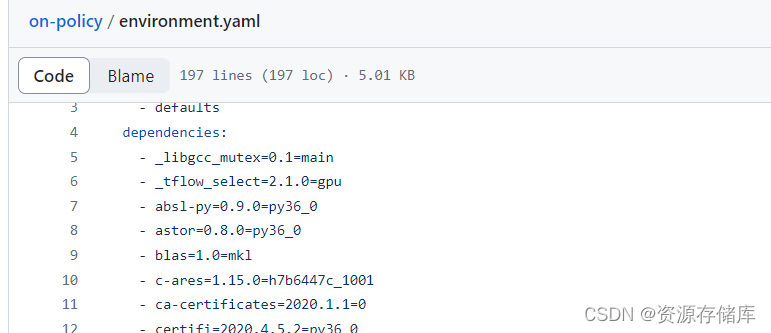目
用pip自动生成requirement.txt(导出第三方库的信息)
用pip一命令安装requirement.txt(所需的第三方库)
用conda命令自动生成environment.yaml (导出第三方库的信息)(保存环境的yaml文件)
用conda命令一命令安装environment.yaml (安装第三方库)(完成环境配置)
1 pip命令:
用pip自动生成requirement.txt(导出第三方库的信息)
pip freeze > requirements.txt用pip一命令安装requirement.txt(所需的第三方库)
pip install -r requirements.txt2 conda命令:
用conda命令自动生成environment.yaml (导出第三方库的信息)(保存环境的yaml文件)
conda env export > environment.yaml 用conda命令一命令安装environment.yaml (安装第三方库)(完成环境配置)
conda env create -f environment.yaml
例子environment.yaml

name: marl
channels:
- defaults
dependencies:
- _libgcc_mutex=0.1=main
- _tflow_select=2.1.0=gpu
- absl-py=0.9.0=py36_0
- astor=0.8.0=py36_0
- blas=1.0=mkl
- c-ares=1.15.0=h7b6447c_1001
- ca-certificates=2020.1.1=0
- certifi=2020.4.5.2=py36_0
- cudatoolkit=10.0.130=0
- cudnn=7.6.5=cuda10.0_0
- cupti=10.0.130=0
- gast=0.2.2=py36_0
- google-pasta=0.2.0=py_0
- grpcio=1.14.1=py36h9ba97e2_0
- h5py=2.10.0=py36h7918eee_0
- hdf5=1.10.4=hb1b8bf9_0
- intel-openmp=2020.1=217
- keras-applications=1.0.8=py_0
- keras-preprocessing=1.1.0=py_1
- libedit=3.1=heed3624_0
- libffi=3.2.1=hd88cf55_4
- libgcc-ng=9.1.0=hdf63c60_0
- libgfortran-ng=7.3.0=hdf63c60_0
- libprotobuf=3.12.3=hd408876_0
- libstdcxx-ng=9.1.0=hdf63c60_0
- markdown=3.1.1=py36_0
- mkl=2020.1=217
- mkl-service=2.3.0=py36he904b0f_0
- mkl_fft=1.1.0=py36h23d657b_0
- mkl_random=1.1.1=py36h0573a6f_0
- ncurses=6.0=h9df7e31_2
- numpy=1.18.1=py36h4f9e942_0
- numpy-base=1.18.1=py36hde5b4d6_1
- openssl=1.0.2u=h7b6447c_0
- opt_einsum=3.1.0=py_0
- pip=20.1.1=py36_1
- protobuf=3.12.3=py36he6710b0_0
- python=3.6.2=hca45abc_19
- readline=7.0=ha6073c6_4
- scipy=1.4.1=py36h0b6359f_0
- setuptools=47.3.0=py36_0
- six=1.15.0=py_0
- sqlite=3.23.1=he433501_0
- tensorboard=2.0.0=pyhb38c66f_1
- tensorflow=2.0.0=gpu_py36h6b29c10_0
- tensorflow-base=2.0.0=gpu_py36h0ec5d1f_0
- tensorflow-estimator=2.0.0=pyh2649769_0
- tensorflow-gpu=2.0.0=h0d30ee6_0
- termcolor=1.1.0=py36_1
- tk=8.6.8=hbc83047_0
- werkzeug=0.16.1=py_0
- wheel=0.34.2=py36_0
- wrapt=1.12.1=py36h7b6447c_1
- xz=5.2.5=h7b6447c_0
- zlib=1.2.11=h7b6447c_3
- pip:
- aiohttp==3.6.2
- aioredis==1.3.1
- astunparse==1.6.3
- async-timeout==3.0.1
- atari-py==0.2.6
- atomicwrites==1.2.1
- attrs==18.2.0
- beautifulsoup4==4.9.1
- blessings==1.7
- cachetools==4.1.1
- cffi==1.14.1
- chardet==3.0.4
- click==7.1.2
- cloudpickle==1.3.0
- colorama==0.4.3
- colorful==0.5.4
- configparser==5.0.1
- contextvars==2.4
- cycler==0.10.0
- cython==0.29.21
- deepdiff==4.3.2
- dill==0.3.2
- docker-pycreds==0.4.0
- docopt==0.6.2
- fasteners==0.15
- filelock==3.0.12
- funcsigs==1.0.2
- future==0.16.0
- gin==0.1.6
- gin-config==0.3.0
- gitdb==4.0.5
- gitpython==3.1.9
- glfw==1.12.0
- google==3.0.0
- google-api-core==1.22.1
- google-auth==1.21.0
- google-auth-oauthlib==0.4.1
- googleapis-common-protos==1.52.0
- gpustat==0.6.0
- gql==0.2.0
- graphql-core==1.1
- gym==0.17.2
- hiredis==1.1.0
- idna==2.7
- idna-ssl==1.1.0
- imageio==2.4.1
- immutables==0.14
- importlib-metadata==1.7.0
- joblib==0.16.0
- jsonnet==0.16.0
- jsonpickle==0.9.6
- jsonschema==3.2.0
- kiwisolver==1.0.1
- lockfile==0.12.2
- mappo==0.0.1
- matplotlib==3.0.0
- mock==2.0.0
- monotonic==1.5
- more-itertools==4.3.0
- mpi4py==3.0.3
- mpyq==0.2.5
- msgpack==1.0.0
- mujoco-py==2.0.2.13
- mujoco-worldgen==0.0.0
- multidict==4.7.6
- munch==2.3.2
- nvidia-ml-py3==7.352.0
- oauthlib==3.1.0
- opencensus==0.7.10
- opencensus-context==0.1.1
- opencv-python==4.2.0.34
- ordered-set==4.0.2
- packaging==20.4
- pandas==1.1.1
- pathlib2==2.3.2
- pathtools==0.1.2
- pbr==4.3.0
- pillow==5.3.0
- pluggy==0.7.1
- portpicker==1.2.0
- probscale==0.2.3
- progressbar2==3.53.1
- prometheus-client==0.8.0
- promise==2.3
- psutil==5.7.2
- py==1.6.0
- py-spy==0.3.3
- pyasn1==0.4.8
- pyasn1-modules==0.2.8
- pycparser==2.20
- pygame==1.9.4
- pyglet==1.5.0
- pyopengl==3.1.5
- pyopengl-accelerate==3.1.5
- pyparsing==2.2.2
- pyrsistent==0.16.0
- pysc2==3.0.0
- pytest==3.8.2
- python-dateutil==2.7.3
- python-utils==2.4.0
- pytz==2020.1
- pyyaml==3.13
- pyzmq==19.0.2
- ray==0.8.0
- redis==3.4.1
- requests==2.24.0
- requests-oauthlib==1.3.0
- rsa==4.6
- s2clientprotocol==4.10.1.75800.0
- s2protocol==4.11.4.78285.0
- sacred==0.7.2
- seaborn==0.10.1
- sentry-sdk==0.18.0
- shortuuid==1.0.1
- sk-video==1.1.10
- smmap==3.0.4
- snakeviz==1.0.0
- soupsieve==2.0.1
- subprocess32==3.5.4
- tabulate==0.8.7
- tensorboard-logger==0.1.0
- tensorboard-plugin-wit==1.7.0
- tensorboardx==2.0
- torch==1.5.1+cu101
- torchvision==0.6.1+cu101
- tornado==5.1.1
- tqdm==4.48.2
- typing-extensions==3.7.4.3
- urllib3==1.23
- wandb==0.10.5
- watchdog==0.10.3
- websocket-client==0.53.0
- whichcraft==0.5.2
- xmltodict==0.12.0
- yarl==1.5.1
- zipp==3.1.0
- zmq==0.0.0






 本文详细介绍了如何使用pip和conda命令分别生成requirements.txt和environment.yaml文件,用于记录和管理Python项目的第三方库依赖,以及如何通过这两个文件进行安装,确保项目的环境一致性。
本文详细介绍了如何使用pip和conda命令分别生成requirements.txt和environment.yaml文件,用于记录和管理Python项目的第三方库依赖,以及如何通过这两个文件进行安装,确保项目的环境一致性。
















 228
228











 被折叠的 条评论
为什么被折叠?
被折叠的 条评论
为什么被折叠?










